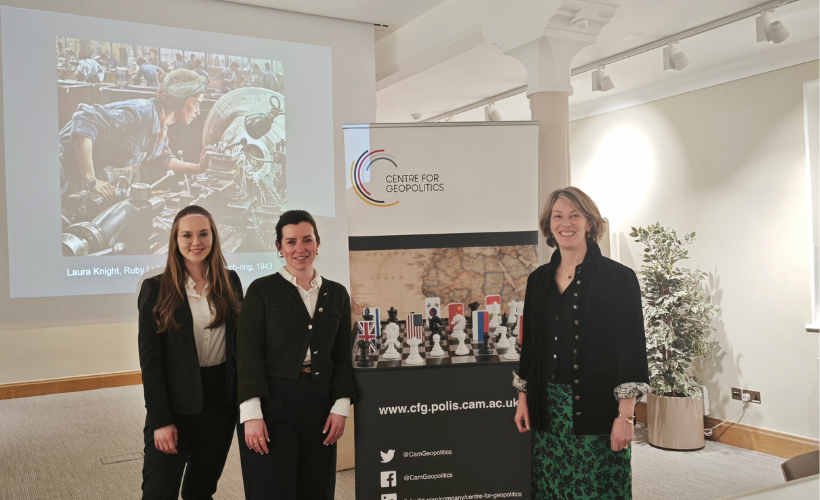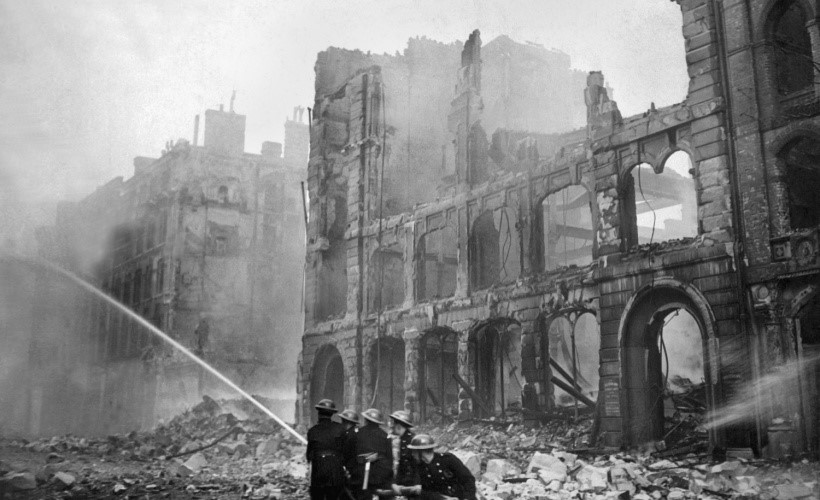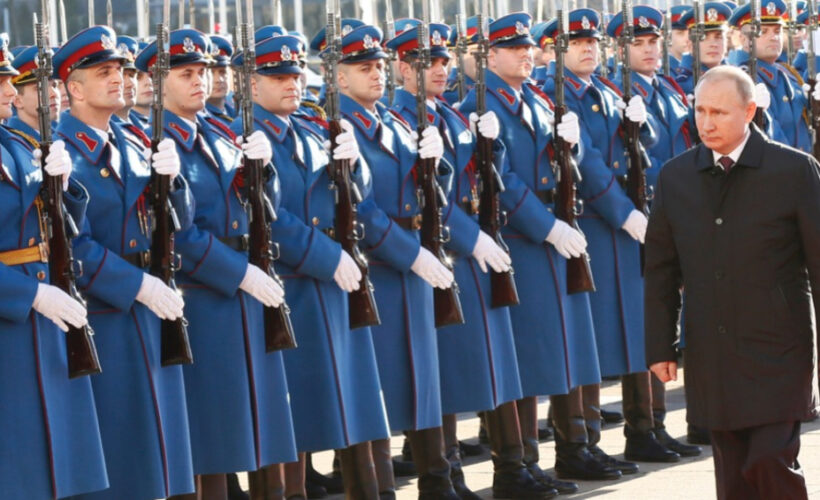In light of the Russian Orthodox Church’s (ROC) complicity in the Kremlin’s violent nationalist polemics, scholars and religious leaders are calling for alternative models of religious political engagement.
I wrote recently about the role of the russkii mir or Holy Rus ideology in Russian expansionism, including the ongoing invasion of Ukraine, and the difficulty for Russian priests to extract themselves from all its political, cultural, and economic entanglements. There has been a tendency in the media to label such Christianist ethno-nationalism as an issue within Eastern Orthodoxy or even Eastern Europe more broadly. But the reality is that Christian Nationalism is on the rise across Europe and beyond, with very similar themes to the russkii mir: sacralisation of political bodies, “good vs evil” polemics applied to political and social issues, secular harbingers of society’s doomsday—to name but a few. Claims to cultural Christianity and “traditional values” resonate as much in European and North American Far-Right movements as in Putin’s Russia. The co-option of the Christian traditions for political purposes continues to divide and polarise countries across the world.
This is not the first time in the last century that religious leaders have recognised political dangers arising from within and without their traditions. In 1937, Catholic, Orthodox, and Protestant representatives from across the theological spectrum convened the ecumenical Oxford Life and Work conference on “Church, Community and State” in New College to coordinate their responses to the rise of Nazism and Totalitarianism, and the collusion of European churches in both. This conference laid the foundation for the World Council of Churches (WCC), which is today the largest global inter-church network, dedicated to ecumenism and cross-tradition dialogue. Oxford scholars continued discussions of Christianity’s relationship to government and society in biannual meetings led by J.H. Oldham between 1938-1944 that became known as “the Moot.” Prominent attendants such as Karl Mannheim and T.S. Eliot were extremely influential in shaping Christian intellectual responses to political and cultural reconstruction in the wake of World War II.
In April, the Protestant Political Thought (PPT) project, jointly based between our Centre and the Blavatnik School of Government in Oxford, continued in the spirit of this tradition by hosting their second annual conference “Christian Identity in National, Transnational, and Local Space: Perspectives from Protestantism, Orthodoxy, and Roman Catholicism.” Once again convening at New College, Oxford, delegates from around the world—Europe, Asia, Africa, North and South America—as well as across and beyond the Christian traditions convened to consider the dangers of religious nationalism in our own times. With the Russian invasion of Ukraine looming large in the background, discussion naturally focused on the russkii mir and political movements within Eastern Orthodoxy. Our keynote speaker, Prof Archimandrite Cyril Hovorun delivered a public lecture in the University Church on “Orthodox Political Theology between National Identity and Empire,” which you can watch on YouTube. We were lucky to have a number of scholars resident in Eastern Europe and the Balkans present both hard sociological data and constructive theory relating to religious political engagement and the relationship between the various national Orthodox churches and the governments of their home countries. However, it quickly became evident from presentations on Christian Nationalism elsewhere in the world and far-Right religious transnational networks that in order to combat the isolating and acrimonious effects of these movements, politicians and religious leaders need coordinated, far-reaching geopolitical solutions, rather than limiting themselves to addressing a particular tradition or region.
Some of the scholars who attended the conference along with a number of international collaborators produced an ecumenical “Statement of Solidarity” with other Orthodox voices condemning the russkii mir, as well as Christian Nationalism and “unholy alliances between Christian identity and political power” in all its forms and all traditions. Perhaps more striking, signees also call for Protestant, Catholic, and Orthodox theologians to work together to provide alternatives to Christian Nationalism, a “Theology after Christendom.” Although independent of the PPT conference and the Centre or the Blavatnik, the Statement was signed in the Old Library of New College, the same room where the WCC was first signed into being, and symbolically presented to Fr Hovorun after his talk. A number of eminent religious leaders and academics from across the Christian traditions signed the Statement—including German Reformed theologian Jürgen Moltmann, Czech revolutionary and Catholic priest Tomáš Halík, Croatian public intellectual Miroslav Volf, and American philosopher Nicholas Wolterstorff, to name a few—which has since been translated into Russian, Ukrainian, Hungarian, Serbian, and Croatian. The “Religion in Praxis” blog run by the Centre for Theology and Religious Studies at Lund University, Sweden, where the Statement was first published online had to close for further signatories after the Statement went viral on social media. Indeed, this group of scholars seem to have tapped into an academic need also felt by the public at large, as the Statement has been covered by media outlets in Poland, Sweden, Hungary, the United Kingdom, Germany, Ukraine, Bosnia and Croatia. As one of the authors of the Statement, Dr Marietta van der Tol at the Blavatnik, put it in her commentary for the Church Times, the Statement “is not only an expression of solidarity, [but] it also comes with a promise”: a promise to invest energy and resources into a brighter ecumenical future for Christian political engagement, fostering hope in the next generation of theologians and political scientists.
The question remains how this ecumenical “theology after Christendom” will take shape—and what role the Russian Orthodox will play in it. The Statement’s connection to the WCC is especially noteworthy in light of the ROC’s uncertain future as part of the WCC. Several influential church leaders including Czech Evangelical pastor Pavel Cerný, American chaplain Rob Schenk, and former Archbishop of Canterbury Rowan Williams have called for the ROC to be removed from the WCC for “failing to oppose” and therefore “effectively endorsing [Putin’s] mass violence against a peaceful nation.” However, acting general secretary of the WCC and Romanian Orthodox priest Fr Ioan Sauca posted a lengthy statement on the WCC website grieving the loss of communication and dialogue were the council to revoke the ROC’s membership. “It is easy to exclude, excommunicate, demonize,” Sauca writes, but warns that the ROC’s isolation will only allow its disfunction to fester and grow. Dissenting voices from within Eastern Orthodoxy at large, particularly the petition from Russian Orthodox priests calling for an end to the invasion of Ukraine, seem to offer hope for reformation from within. In his public lecture for the conference, Fr Hovorun, who himself previously worked in the administration of the Russian Orthodox Patriarchate, presented a way forward for Orthodoxy: to move away from “symphonia” with the state (a musical term often used for cooperation between Orthodox churches and Eastern polities) and towards a “symphonia of civil society.” As religious nationalism often springs from church-going populations that feel their needs, values, or way of life neglected or threatened, this balance of civil, local engagement with transnational efforts for solidarity may offer a stabilising middle way. For now, with the war in Ukraine still raging and the WCC divided, it is up to hopeful scholars, religious leaders, and politicians, like the signees of the “Statement of Solidarity,” to set a positive example—to work together on practical solutions and promote mutual understanding—if they are to show the ROC and Christian Nationalists across the world that there is a viable alternative to ethno-phyletism and secular domination.
Stay connected to receive updates for the PPT’s third annual conference next year, which will address the idea of “Theology after Christendom.”
Sophia R.C. Johnson is a doctoral candidate and associated lecturer in the Faculty of Divinity at the University of Cambridge. She also co-chairs the Protestant Political Though project jointly based between the Centre for Geopolitics in Cambridge and the Blavatnik School of Government at the University of Oxford. Her research centres on the political uses of and influences on interpretation of the Hebrew Bible/Old Testament, both in its original ancient context and in modern reception history. She will be taking up a DAAD research fellowship at the University of Göttingen in October 2022 to study the political and cultural effects of post-war Germany on 20th-century Continental biblical interpretation.







